So you’ve already chosen a profitable niche for your blog, but you’re not sure what topics or keywords there are in your niche, and what you should write about first? Then, this is for you.
When you’re fully aware of all the keywords in your niche, and the hierarchy of those relevant keywords, you will be able to plan your content, prioritize them to monetize your blog, and identify which ones can wait.
Moreover, finding the right keywords to target when you’re new to blogging will also allow you to connect to your target audience right off the bat.
I’m sure you don’t want to spend hours and hours writing contents that no one wants to read, right?
So in this post, I will share with you the keyword research methods I use to get unlimited ideas on blogging topics for any niche.
I’m confident that after reading this, you’ll never worry about running out of keyword ideas or topics for your blog.
I’ve created a detailed video for this topic but you can also read the article below.
Let’s get started.
1. Take Advantage of Competitor Websites
Your competitor sites (aka doppelgangers) are great places to get ideas on relevant keywords on your niche.
Now, before you can find keywords in your niche, you first need to identify your competitor sites, and you can do that by doing a simple Google search using a common keyword.
For example, if your blog is about guitars, you can Google something like “best guitar course for beginners” and you will find products and brands that are relevant to guitars.

Then, the next thing you need to do is find reviews on those guitar-related products. The reason why I recommend searching for product review keywords is because it is common for bloggers (affiliate site owners) with the intention for monetization to rank for these keywords.
So back to our example, one of the top results on my search for “best guitar course for beginners” is Guitar Tricks.
Then, you need to search for “Guitar Tricks review” to find the sites that are ranking for this keyword and identify which ones are affiliate sites.
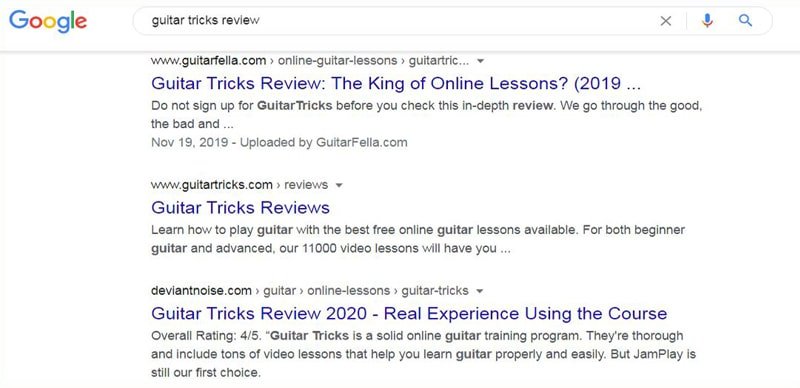
You can quickly identify affiliate sites because they often have an affiliate link or a button on their post that redirects to an affiliate product.
One of the top-ranking sites for “Guitar Tricks review” is Guitar Fella and it turns out to be an affiliate site.
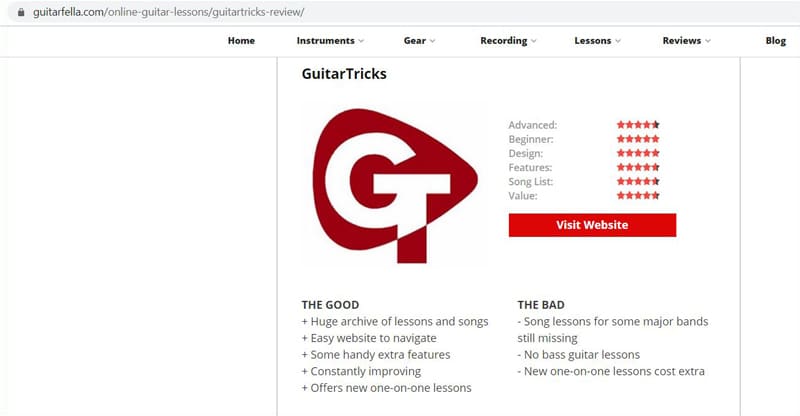
You can also visit other sites ranking for the keyword “Guitar Tricks review” and see which ones are affiliate sites – the more affiliate sites you can find, the more keyword ideas you will have.
Once you’ve identified your competitor sites for your niche, it’s time to find out what keywords they are targeting by using the Sitemap and Site Colon feature of Google.
How to use Sitemap and Site: for keyword research?
Sitemap – This free tool from Google will allow you to see the post and page URLs of your competitors.
Bloggers will naturally optimize their content URLs to contain keywords in their target niche because that is basic SEO practice.
To do this, you need to include sitemap.xml (or sitemap_index.xml for Yoast users) at the end of your competitors’ site URL.

Using Guitar Fella as an example, you should see something like this:

Then you can click on the entries like the ones in the image above, and you’ll get something like these:


As you can see in the snipped images above, you can quickly identify keywords for guitar niche (e.g., best acoustic guitar brands or DigiTech SP-7 Review) just by looking at the URLs.
Site Colon (Site:) – The “site:” search on Google allows you to see the domain URLs that are indexed by Google for a particular site.
The good thing about the site colon search is it allows you to see the meta title and meta descriptions of the posts of your competitors, which reveals a lot about their target keywords.

Then you just have to jot down all the keywords you’ve found from your competitors’ sites using the two methods above and analyze which ones you should prioritize in writing contents first.
Analyzing keywords and finding the optimum content topics to get started with is a crucial process that can dictate the growth rate of your blog.
So for this part, I created another video that will walk you through the entire keyword selection process:
Useful resources for finding top priority keywords that will help your contents rank faster on Google:
- Income Stream Builders Keyword Analysis Sheet
- Jaaxy Keyword Tool Free Trial
- Domain Authority Checker by SmallSEOTools
2. Google Alphabet Soup
The next keyword research idea I’ll share with you is still through Google. This method is known as the Google Alphabet Soup.
In fact, #1-4 on this list all has to do with Google simply because it is free and proven time and time again.
So what is the Google Alphabet Soup?
It is called alphabet soup because you’ll need to run a particular keyword from A to Z (the entire English alphabet) and check out the autofill suggestions.
The autofill suggestions are actual queries coming from people who search for something that contains your keyword.
For example, if your blog is about fishing, you will search something like “how to fish A” down to “how to fish Z”, and you’ll see suggestions like this:


Now, some suggestions might not be relevant to your blog, so it’s up to you to filter them out and only take note of the keyword suggestions that make sense.
If there are keyword suggestions that you’re not familiar about, you can do further research about them to see if they can be a topic for your content.
3. Use the “People also ask” section on Google
When you search for something on Google, say “how to start fishing as a beginner,” you will notice a section that says “People also ask” that contains related questions to your original query.

Browse through the related questions to see if they can be a viable topic for your blog.
And if you click on the queries in the “People also ask” section, Google will show you more questions other people are searching for related to this topic.
Once you have a lot of related topics for your first query, you simply type in another keyword for your niche and repeat the same process.
4. Google “searches related to” Section
Another way to find blogging contents on Google is through the “searches related to” section.
You just need to type in your query in the Google search bar, hit enter, and scroll down to the bottom of the search result where Google will show you keywords and topics that are relevant to your original query.
As an example, for the keyword “where is the best place to start fishing”, these are some of the viable topics you can use for your fishing blog.

If you haven’t noticed, Google is giving you all these free tools to find a seemingly endless topic for your blog.
But if it’s still not enough, here’s more…
5. Pinterest
Recently, more and more bloggers are using Pinterest to drive high-quality traffic to their websites.
But other than that, you can also use Pinterest to find high-quality keywords for your blog contents.
The first way to do keyword research on Pinterest is through the Pinterest search bar.
Just like how you do the Google alphabet soup, you just need to type in a general keyword for your niche on Pinterest and see what the autofill recommendations are.

Then you can type in the keywords you found on Pinterest in Google and use the same keyword research methods we’ve discussed above (#2-4) to see more topic ideas.
There are other ways to do keyword research on Pinterest that includes Guided Search, Creating Ads (without actually spending money), and Top Pins.
However, the three Pinterest keyword research methods above require a more in-depth explanation so I discussed each of them in complete detail here.
6. Duckduckgo Alphabet Soup
The duckduckgo.com is another browser and search engine like Google, except for the fact that it does not profile it’s users.
What I mean is that Google will consider what it knows about you (such as your location, previous queries, general search behaviour, etc.) when displaying search results for your queries.
So even if you and I will type exact search terms like “best place to travel”, we will get different results.
But since Duckduckgo upholds privacy among its users, every single one gets exactly the same results for search queries, regardless where you are in the world and what are your previous queries on the site.
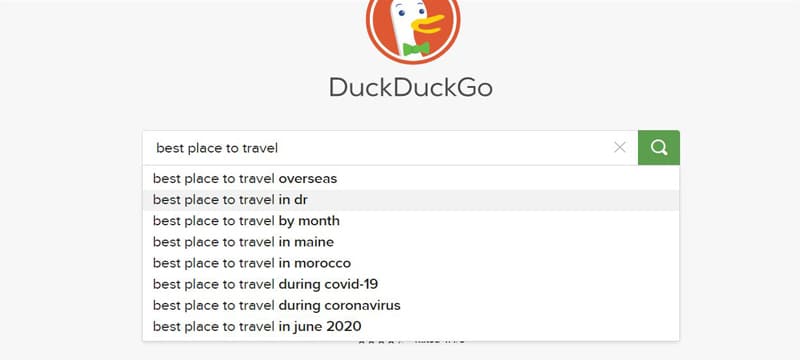
Using the alphabet soup, you can take advantage of the privacy feature of Duckduckgo to find popular blogging topics for your niche that are otherwise impossible to find on Google.
7. Answers.com
Answers.com is a user-generated question and answer website.
How it works is that when people ask a question on this platform, other users can provide an answer.
So if you type in a keyword, Answers.com will show you the discussions that contain the keyword that you typed in.
You just type in your question or a keyword and you’ll see post relevant to your query.

And if you notice, some people will provide links to their source when answering your question.
If you are particularly knowledgeable about your niche, you can use this practice to your advantage.
You can spend some time on Answers.com and provide useful information about your niche that eventually leads people to your blog.
Answers dot com also has a “Related Questions” section that shows possible topic ideas that are related to your original query.
And though many of the suggestions might be less related to your niche, you can still find viable topics to discuss in your blog.

8. Quora
Quora (quora.com) is another question and answer website similar to Answers.com where questions are asked, answered, followed, and edited by users, either factually or in the form of opinion.
You can type in your query on Quora, and you’ll find questions and answers related to your query.

You can then click on the results that are relevant to your blog and find topics and content ideas from there.
Quora has a much larger user base, and it has thousands of topics and categories about topics for various niches.
And again, if you’re well-informed about your niche, you can also answer other people’s questions while getting more topic ideas for your blog.
This way, you can help other people find useful information while you’re building your authority in your blogging niche.
9. Reddit
Reddit.com is similar to Quora and Answers.com, but it is more of a tightly-knitted community than a public question and answer platform.
When you type in a keyword on the Reddit search bar, e.g., fishing, you will find communities and users that are discussing this topic.

You can then click on the community that is relevant to your niche and find possible topic ideas for your blog.
If you want to partake in discussions, you need to join the community first.
But if you’re simply looking for topic ideas for your blog, it is possible to view the topics on particular communities without joining.
You can also read other users’ posts in the communities to find more topic ideas for your blog.
10. Ubersuggest
Ubersuggest is a free SEO tool recently acquired by entrepreneur Neil Patel, and you can use it to get keyword and content ideas for your blog.
You just have to type in a query related to your blogging niche in the search bar…

And you’ll get tons of keyword and viable blogging content topics for free!
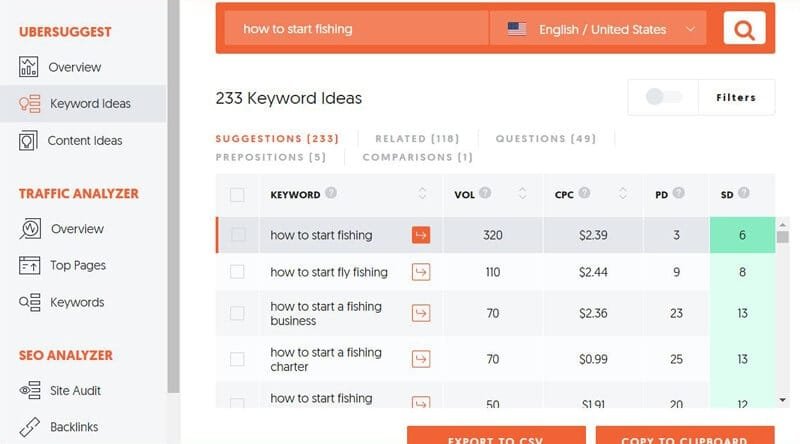
Ubersuggest will also show you some metrics on the keyword ranking difficulty, which will give you an idea of the topics you should prioritize.
If you want a quick review about keyword analysis, click here.
Another thing I like about Ubersuggest is it also has a section called “CONTENT IDEAS” where it shows page titles and URLs of popular posts relevant to your query.
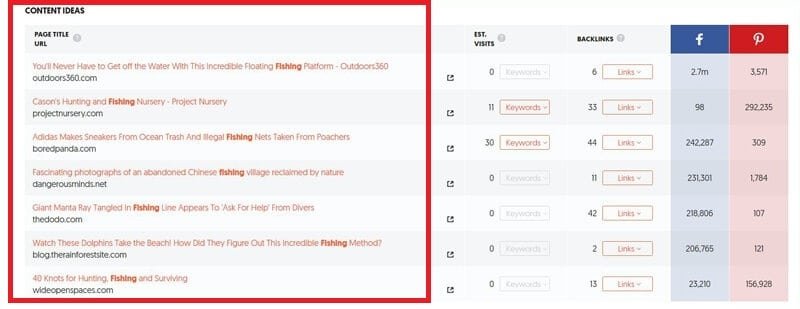
You can then visit these sites, perform the step #1 keyword research method I’ve shared on this list, and you’ll get tons of additional ideas for your blog contents.
Summing it up
Starting your blogging journey on the right foot takes you to the right track for success. I highly recommend that you take this affiliate blogging course to set you in the path of success.
Anyway, I hope that this article has helped you, and if you have any questions and clarifications, let me know in the comments below.
Thank you for your time and do come back now and then because I’m constantly uploading new contents like blogging tips, affiliate marketing success tips, and proven ways to make a passive income online.
Until next time and I wish you all the best.
Your friend,
Jack
Recent Content
9 Best Niche Ideas For Pinterest Affiliate Marketing 2020 & Beyond
If you're looking for ways to start a profitable affiliate marketing business on Pinterest, then this is for you. According to Pinterest Newsroom, the COVID 19 pandemic has caused a significant...
So, you're looking for good ways to generate an income using your ability to speak more than one language? Then this is perfect for you! I took the time and compiled a list of 11 high paying...

